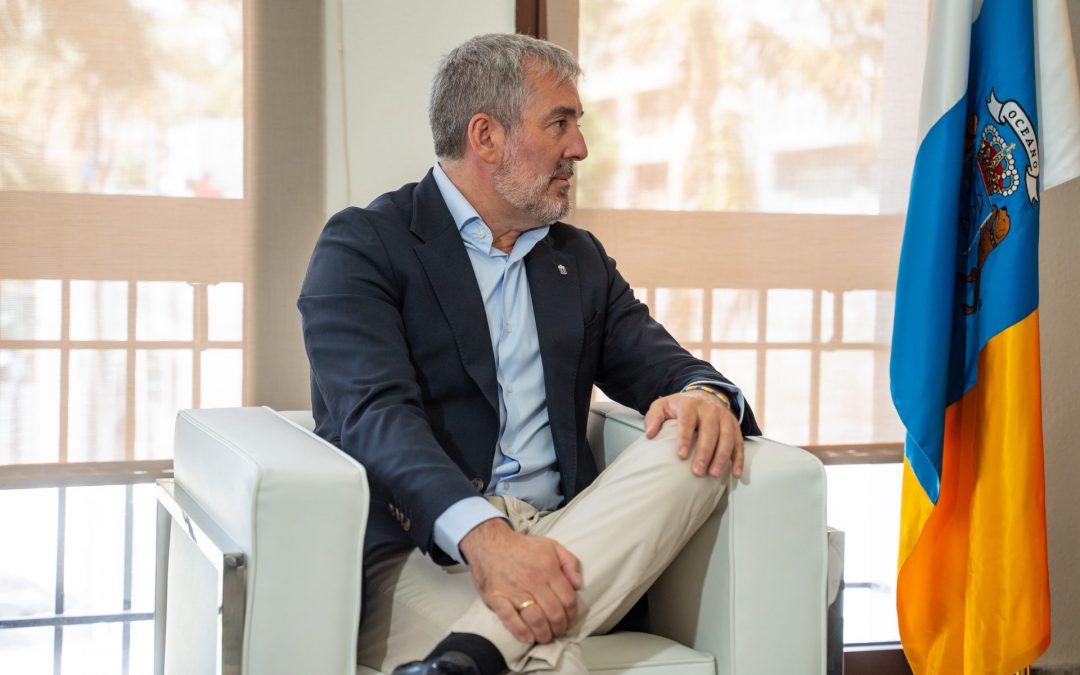The President of the Government of the Canary Islands, Fernando Clavijo, sent a letter this Wednesday to the President of the European Parliament, Roberta Metsola, requesting to appear before the MEPs to present the “limit” situation that the islands are experiencing and to request the support of the European Union (EU) in the face of the migration emergency.
The goal of the Spanish regional government’s head is to convey firsthand to the European parliamentarians the “emergency situation” in which the Canary Islands find themselves, facing alone “the largest migratory crisis in our history.”
In his letter, Fernando Clavijo proposes to Metsola to intervene in the Committee on Civil Liberties, Justice and Home Affairs (LIBE) or another committee of the European Parliament that she deems appropriate.
The letter to the president of the European Parliament recalls that the archipelago is currently experiencing record arrivals of cayucos, which represents a “huge impact” on all levels in the archipelago, “which already suffers the inherent constraints of ultra-peripherality and where the effects of the massive arrival of migrants is a major challenge that must undoubtedly be addressed with support and a coordinated strategy among all institutions, at regional, national, and European levels.”
From January 1 to August 31 of this year, the Canary Islands have already received 25,554 migrants, representing an increase of 123% compared to the first eight months of 2023, a year in which 39,910 people arrived in the archipelago by sea, highlight the Executive in a note.
This figure was already 154% higher than the one recorded in 2022 and broke the historical record reached in the so-called ‘cayuco crisis’ of 2006.
Clavijo emphasizes to Metsola that, as the southern border of Europe, the Canary Islands are the entrance to European territory for many migrants traveling from the coasts of West Africa, through the ‘Atlantic Route’, “one of the deadliest migratory routes in the world, where many people lose their lives in their attempt to reach European soil.”
According to NGO data, a migrant dies en route to the Canary Islands every 45 minutes.
In particular, the head of the Canary government draws the attention of the Eurochamber’s head to the “completely unsustainable” situation the islands are experiencing due to the increase in the arrival of unaccompanied minor migrants, currently cared for in centers on the archipelago about 5,500 boys and girls.
The letter sent this Wednesday to the re-elected president of the European Parliament adds to the efforts the Government of the Canary Islands is making to “launch a call for support, unity, and solidarity” in search of “a common response to this migratory challenge, which should not be assumed by the regions on the front lines, as external borders, and which requires a coordinated multi-level response,” explains Clavijo to Metsola.
As part of this strategy, the president of the Canary Islands has already invited the president of the European Commission twice to see firsthand the migratory drama.
The first was when Ursula von der Leyen traveled to Lampedusa in September 2023 and the latest last week amid the strong surge of boat arrivals and the saturation situation of the minor care system.
Fernando Clavijo also asked the Pope to travel to the archipelago to give international visibility to the migratory crisis during the meeting they held on January 15 in Rome, as he did on November 17 last year with the European Commissioner for Home Affairs, Ilva Johansson, who finally came to the Canary Islands a month later.
On April 17th, the president of the Canary Islands also met in Brussels with the EU’s High Representative for Foreign Affairs and Security Policy, Josep Borrell, to learn firsthand about his geopolitical forecasts for Africa and, in particular, the unstable Sahel region.
In November 2023, he also held a round of meetings with the main parliamentary groups in the Eurochamber to ensure that the Atlantic Route received similar treatment to the Mediterranean route in the European Pact on Migration and Asylum that was approved last April after a long negotiation period.
 go to the original language article
go to the original language article
